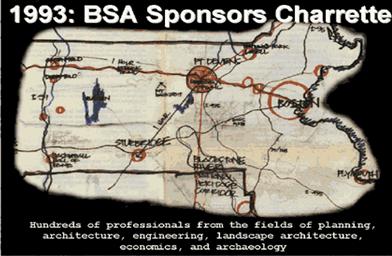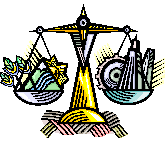

|
DEVENS ECO-EFFICIENCY CENTER Helping area businesses and organizations reduce their environmental impacts and operating costs through education, collaboration and technical assistance. |

|
Devens Eco-Efficiency Center 33 Andrews Parkway Devens, Massachusetts, USA 01434 Phone: 978.772.8831 x3304 Fax: 978.772.1529 E-mail: donaneely@ecostardevens.com |
|
Q Sustainable Devens |
|
The Devens Eco-Efficiency Center is a 501(c)3 non-profit organization, established in 2007. This institution is an equal opportunity provider and employer. |
|
Sustainable Devens— the Evolution of EcoStar and the Devens Eco-Efficiency Center Sustainability is the guiding principle for re-development of Devens. Sustainable development concepts recognize that we are part of a natural system and promote a balance of social, economic and environmental issues to create healthy places to live, work and play, while recognizing, respecting and maintaining the natural system that exists. The EcoStar program was developed as a tool to aid in implementing and promoting sustainability in Devens and the surrounding communities.
Devens commitment to sustainable development originated soon after the base closure was announced in the early 1990’s and the Commonwealth and the surrounding communities began planning for the future re-use of Devens. A charette process conducted by the Boston Society of Architects in 1993 generated community consensus on a future vision for Devens. This vision included a discussion of industrial ecology, zero emissions industry and no-waste systems – three areas that relate to sustainable processes that mimic natural ecosystems.
The Eco-Industrial Park Concept: An eco-industrial park is an environmentally friendly version of an industrial park, where a group of companies exchange and make use of by-products and/or energy – similar to the processes within a natural ecosystem. The eco-industrial park approach in Devens promotes organizations working together as a group to share and exchange resources and improve operating efficiencies, ultimately saving time and money while at the same time achieving the goal of sustainability.
"An eco-industrial park (EIP) is a type of industrial park in which businesses cooperate with each other and with the local community in an attempt to reduce waste, efficiently share resources (such as information, materials, water, energy, infrastructure, and natural resources), and produce sustainable development, with the intention of increasing economic gains and improving environmental quality.” - Wikipedia Website: http://en.wikipedia.org/wiki/Eco-industrial_park "The goal of an EIP is to improve the economic performance of the participating companies while minimizing their environmental impacts. Components of this approach include green design of park infrastructure and plants (new or retrofitted); cleaner production, pollution prevention; energy efficiency; and inter-company partnering. An EIP also seeks benefits for neighboring communities to assure that the net impact of its development is positive." - Indigo Development Website: http://www.indigodev.com/index.html
Sustainability was defined in the 1994 Devens Re-Use Plan as “a balance of economic, social and environmental needs, while maintaining and enhancing the natural resource base”. In order to achieve a vision of sustainable development at Devens, a sustainability indicators project was developed. This project took the components of sustainability and applied indicators that would accurately reflect the presence or absence of those components – a way of measuring whether or not sustainability was being achieved. This exercise uncovered the need for a stronger effort to promote industrial ecology. Development of an eco-industrial park was a concept that would address both environmental protection and economic development.
Development of the EcoStar Program: In 2002, the Devens Enterprise Commission (DEC), under the direction of Peter Lowitt, created a steering committee comprised of citizens, business representatives, government officials and environmental advocates to develop a program that would help strengthen the eco-industrial park concept and assist organizations in working together towards a sustainable future for Devens. Through their research, the committee found that local businesses and organizations were more likely to participate in a program that provides technical assistance and recognition for implementing efficiency measures and pollution prevention initiatives. The Steering Committee thus began work on developing EcoStar - an environmental achievement and certification program. Through EcoStar, participating organizations commit to continuous environmental improvement that goes beyond standard compliance and promotes the development of partnerships to support achievement of a wide range of environmental, economic and social performance standards. Development of this program was jointly funded by the DEC and a Massachusetts Department of Environmental Protection Solid Waste Planning Grant.
Throughout 2003 and 2004, the Steering Committee continued to develop EcoStar, following the concepts of industrial ecology. Performance standards were developed in-line with eco-industrial concepts to ensure the future vision for a sustainable Devens could be measured and achieved. Twenty-five standards form the main core of the program. A participant that incorporates fifteen of them into their operational practices earns recognition as an “EcoStar Achiever.” The program and standards focus on waste and toxics usereduction, water and energy efficiency, recycling, purchasing of environmentally preferable products, and other sustainability efforts. EcoStar encourages collaboration between firms to improve resource efficiency and support environmental protection. With the assistance of a grant from the Intel Foundation, the DEC completed the comprehensive EcoStar Action Guide and worked with a local graphic design firm to develop a program logo and informational brochure.
EcoStar was launched in 2005 with great success and promise, providing organizations with a venue to create linkages amongst organizations and with the community. Today EcoStar is recognized as a promoter of both business and the environment, and more than 30 organizations from Devens and surrounding communities have joined the program. Members include commercial and industrial entities of all sizes, as well as institutional and governmental organizations.
Since the launch of EcoStar, the DEC has hosted workshops to educate and help organizations to adopt more economically and environmentally efficient practices. Workshops also facilitate the formation of partnerships, not only between businesses, but also between public and private agencies that support sustainable development initiatives.
The Devens’ progress with sustainable development and the DEC's EcoStar program have received awards and worldwide recognition. In 2005 the DEC accepted a Sustainability Award from the Commonwealth of Massachusetts and EcoStar received an Environmental Award in 2006 from the Worcester Business Journal and Mass. Audubon. Mr. Lowitt has presented case studies on the community’s sustainability efforts and the EcoStar program to audiences in Thailand, Vietnam, Sweden, Canada, Denver, Minnesota, and Massachusetts. The EcoStar team is committed to see that the program continues to serve as a model for sustainable practices.
Looking Ahead…. In addition to the current program benefits EcoStar offers members, the EcoStar team is working on an expanded suite of services under the Devens Eco-Efficiency Center. These initiatives build on the EcoStar offerings and include additional support services that promote energy efficiency, the adoption of renewable energy technologies, the co-ordination of shared services, waste exchanges, and resource conservation and pollution reduction. All of the service offerings provided by the Devens Eco-Efficiency Center enable cost-savings for the local business community! |





